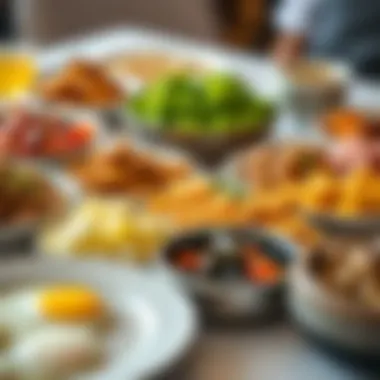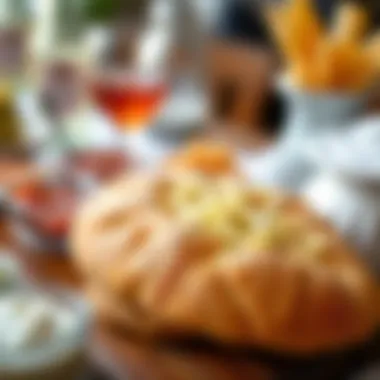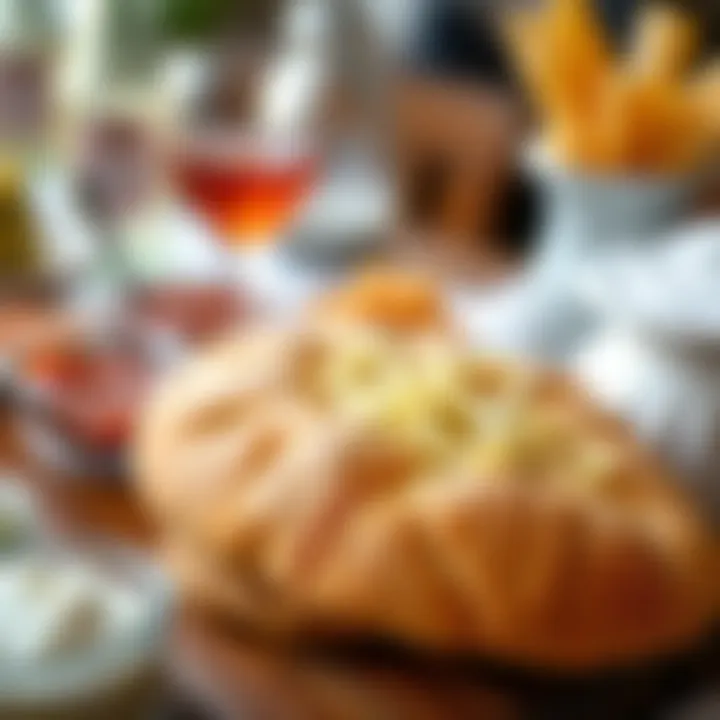Indulging in Authentic Arabic Breakfasts in Dubai


Intro
Dubai, a dazzling city of skyscrapers and luxury, stands as a beacon of diverse cultures and rich culinary traditions. Among the many gastronomic delights that this metropolis offers, Arabic breakfast holds a special place in the hearts of both locals and visitors. Breakfast is more than just the first meal of the day in the Arab world; it is often a vibrant feast that tells a story of heritage and community.
The breakfast scene in Dubai showcases a unique blend of traditional dishes infused with regional flavors, reflecting the multicultural essence of the city. It’s a culinary journey that starts at sunrise when the streets come alive with the aroma of spices and freshly baked bread. From hearty fare to lighter options, the Arabic breakfast experience is a delightful way to begin one’s day.
This guide explores the best Arabic breakfasts in Dubai, diving deep into not only the dishes themselves but also the cultural significance and the personal experiences they evoke. Join us on this journey—let’s savor the rich flavors, uncover the stories behind each dish, and discover where to indulge in these culinary treasures.
Prelims to Arabic Breakfast Culture
Breakfast in Arabic culture isn't just about the food; it’s a window into a rich tapestry of history and traditions. In Dubai, where East meets West, breakfast serves as a notable focal point for both locals and visitors. Understanding this breakfast culture offers valuable insights into the identity of a place, revealing culinary practices that have evolved over centuries.
When you first step into a café or restaurant in Dubai, the breakfast menu can be overwhelming. The variety of options showcases regional specialties and changes according to seasonal ingredients. This diversity in choice isn't merely for sustenance but instead celebrates family, community, and hospitality. Here, gathering for breakfast fosters connections and is often a cherished ritual, bonding individuals and families over shared meals. For anyone looking to immerse themselves in what Dubai has to offer, understanding this cultural backbone of breakfast is crucial.
Historical Context
The roots of Arabic breakfast trace back to ancient civilisations that flourished in the region. From the striking bazaars pulsating with scents of spices to the quiet warmth of home kitchens, each bite recounts stories of trade and migration. Historically, breakfast consisted of what was available locally—grains, dairy, fruits, and spices—each bringing flavors that reflect the region’s abundant agricultural practices. For instance, flatbreads have existed for thousands of years, providing a staple that regional practices have enhanced with various toppings, from olive oil to za’atar.
Delving deeper, one can observe influences from Ottoman, Persian, and other neighboring cultures that shaped Arabic breakfast traditions. Each period introduced new elements, whether it was the introduction of fool (fava beans) from Egypt or hummus, resonating beautifully with the local palate. This blend of historical influences adds a layer of richness that’s essential to understanding why these breakfasts hold a significant place today.
Cultural Significance
In the Arab world, meals are often surrounded by traditions and etiquettes that hold deep meanings. Breakfast is not just a fuel-up meal; it plays a vital role in social interactions and family gatherings. Inviting someone for breakfast is a gesture of goodwill, an invitation to connect over food that is lovingly prepared. In Dubai, where the expat community flourishes, this aspect is amplified. Different cultures frequently meld, creating fusion breakfasts that embody a blend of traditions.
Moreover, innovating classic dishes paints a picture of continuity and change. This reflects the adaptability of the culture while maintaining respect for its roots. As a result, repeated figures like labneh (strained yogurt) and shakshuka (poached eggs in tomato sauce) may also include modern twists, effectively marrying the past with the present. To engage with these foods is to engage with the community and its stories—a delectable journey into the heart of what makes Dubai's breakfast culture so vibrant.
"Food is not just sustenance in Arabic culture; it’s a form of communication, a way to express love and connection."
As you look to explore the best Arabic breakfasts in Dubai, keep this context and significance in mind, as it infuses every bite with meaning.
Typical Ingredients in Arabic Breakfast
The core of any culinary tradition is the ingredients that bring life to its dishes. In the context of Arabic breakfasts, the significance of typical ingredients cannot be overstated. These components not only define the flavors but also embody cultural heritage and regional identity. Understanding these ingredients enrichens the eating experience and deepens appreciation for the diverse offerings in Dubai.
Staples and Spices
At the heart of Arabic breakfasts lies a selection of staples that are integral to daily meals—bread, grains, and legumes lead the charge.
Pita bread is possibly the most recognizable of these staples, serving multiple roles from a vehicle for dips to a side for main dishes. Rice is another foundational element, often spiced and served alongside meat or vegetables. Legumes, particularly lentils and chickpeas, are crucial for their nutritional value and versatility, being transformed into dishes like foul medames, which serve as a hearty breakfast option.
Spices play a pivotal role, weaving intricate flavors into the fabric of Arabic cuisine. Common spices such as cumin, coriander, and zaatar—a fragrant blend of wild thyme, sesame seeds, and sumac—are essential to enhance the profiles of these breakfast items. For instance, adding zaatar to labneh not only elevates the taste but also adds depth related to its mountain of herbal histories.
"Spices not only add flavor; they tell stories of trade, migration, and tradition."
Every region in the Arab world has its unique spice blends and usage, yet in Dubai, one finds a unique mingling of influences that reflect both local heritage and expat communities. The spices in an Arabic breakfast can often be the bridge that ties flavors to memories and landscapes.
Fresh Produce
Fresh ingredients add vibrancy to any meal, and Arabic breakfasts are no exception. The emphasis on using fresh produce stems from the region's agricultural practices which have adapted over centuries. The typical breakfast plate often showcases a colorful array of vegetables and herbs.
Tomatoes, cucumbers, and radishes frequently find their place in breakfast spreads, whether in salads or as sides to richer dishes. Their crispness adds much-needed contrast against denser items like frittatas or creamy dips. Including herbs such as parsley and mint not only brightens the flavors but also contributes to the health benefits of the meal, enhancing its appeal to health-conscious individuals.
It's worth noting that seasonal variations mean certain fruits and vegetables may come to the forefront during different times of the year. For example, in warmer months, you might see figs and pomegranates making appearances, while winter might favor more robust squash or root vegetables.
Thus, fresh produce is not just an accessory; it's a vital part of the culinary narrative that embraces health and heritage in Dubai's Arabic breakfasts. Engaging with these ingredients allows for a sensory exploration that connects the diner with the local culture and environment.
Iconic Dishes in Arabic Breakfast
Arabic breakfast is a vibrant mix of flavors and textures, reflecting the region's rich culinary heritage. In Dubai, the breakfast table is laden with iconic dishes that not only satiate hunger but also tell a story of traditions passed down through generations. These dishes encapsulate the essence of Arabic culture and hospitality, fostering community and connection among families and friends.
The importance of these dishes in the article is manifold. Each dish brings with it a variety of ingredients, cooking techniques, and even a slice of history. Understanding these iconic meals allows one to immerse deeply into the local culture, making them more than just sustenance—they become a delightful exploration of culinary art.
In addition, these dishes cater to various dietary preferences, showcasing the flexibility of Arabic cuisine; hence, they hold importance for anyone looking to broaden their culinary horizons.
Hummus and Labneh
Hummus, a creamy blend of chickpeas, tahini, lemon juice, and garlic, stands out as a fundamental part of Arabic breakfast. It’s versatile enough to be served with pita bread, fresh vegetables, or as an accompaniment to other dishes. You might find it garnished with a drizzle of olive oil and a sprinkle of paprika, which enhances both its visual and flavor profile. Its popularity isn’t just confined to breakfast; it’s an all-day delight that transcends boundaries, often appearing on dining tables around the globe.
Labneh, on the other hand, is a thick yogurt spread that offers a tangy contrast to the rich flavors of hummus. Supremely versatile, it can be eaten plain, or jazzed up with herbs and spices, such as za'atar, a cumin or sumac blend that delivers a bite that keeps you coming back for more.
Both dishes signify the Arab spirit of sharing. It's common to find a large platter set in the middle of the table, where everyone can dip and enjoy together, reinforcing the idea of unity and communal dining.
Fool Medames
Another staple, Fool Medames, is a hearty dish made from fava beans cooked in spices. This dish has roots tracing back to ancient Egypt, and it has made its way into the breakfast culture in Dubai. Often served warm, it typically comes drizzled with olive oil and topped with fresh herbs like parsley or cilantro, alongside a squeeze of lemon.
What sets Fool Medames apart is its simplicity and heartiness. It offers a filling option for those starting their day, ensuring you won’t feel hungry until the lunch bell tolls. Plus, its rich protein content makes it a beloved choice for vegetarians and those seeking a healthier breakfast.
Shakshuka
Shakshuka brings a touch of heat to the breakfast table. Originally from North Africa, this dish features poached eggs in a spicy tomato sauce spiced with cumin and paprika, served bubbling hot in its skillet. Incorporating flavors like bell peppers and onions creates a robust dish that tantalizes the taste buds.
The experience of digging into shakshuka is grounded in the sensory indulgence it offers—the aroma wafts through the air, the colors burst on the plate, and the combination of textures is unmatched. Pair it with crusty bread, and you have one of the most satisfying meals to kickstart your day.


Manakish
Last, but certainly not least, is Manakish, often referred to as the Middle Eastern flatbread and regarded as a breakfast classic. The base is typically made of dough layered with a variety of toppings, including za'atar, cheese, or even minced meat. These toppings vary based on personal and regional preferences, showcasing the dish's adaptability.
The act of grabbing a warm, fresh manakish is more than just eating—it's part of the morning ritual for many in Dubai. Often enjoyed while on the go, it embodies the convenience and taste that define Dubai's dynamic lifestyle.
For many, these iconic dishes are more than just breakfast; they represent the heart and soul of Arabic culture. Through each bite, one can taste the tradition, family recipes, and love that go into these meals, which can be shared among friends and family, creating bonds over food and stories.
"Food is not just what we eat, it’s who we are and where we come from."
Learn more about these dishes and their culture of origin on resource sites such as Britannica or immerse yourself in local insights via Reddit.
Best Places for Arabic Breakfast in Dubai
Finding the ideal spot for Arabic breakfast in Dubai transcends mere dining; it’s about embarking on a culinary journey that captures local flavors and traditions. Considering the rapidly expanding food scene in this vibrant city, knowing where to start can be a challenge. The importance of identifying the best places for this meal lies not only in the food experience but also in how each location resonates with the culture and community of Dubai. A good breakfast can set the tone for your day, and immersing in the rich tastes of Arabic dishes provides a window into the heart of Emirati hospitality.
Local Favorites
When it comes to local favorites, you’ll find several establishments that have won the hearts of Emiratis. These places serve breakfast dishes that are steeped in tradition, offering both authenticity and flavor.
- Al Mallah: Revered for its foul medames and freshly baked manakish, this spot buzzes with locals. Al Mallah is a charming food joint where each dish bursts with flavor, reflecting time-honored recipes passed down through generations.
- Suq Al Qaryat: Nestled within the busy market area, this restaurant serves hearty breakfasts featuring hummus and warm bread. The bustling atmosphere enhances the experience, as you enjoy your meal surrounded by the sounds of traders and shoppers.
Eating breakfast here not only fills your stomach but also immerses you in the rhythm of local life.
Upscale Dining Experiences
For those looking to experience Arabic breakfast in a more elevated setting, Dubai has its fair share of upscale dining. These venues combine fine dining with traditional flavors, creating a unique fusion that caters to discerning palates.
- Arabesque: As part of a luxury hotel, this restaurant delivers a brunch experience like no other. With dishes artfully presented, such as shakshuka topped with herbs and spices, it shines a light on fine culinary craftsmanship while maintaining the essence of traditional flavors.
- Zahr El-Laymoun: Situated with a view of the Dubai skyline, this venue serves breakfast with a twist. Think labneh paired with avocado and za'atar, offering a modern flair that caters to the health-conscious. The ambience here elevates your meal into a calming and refined experience.
Hidden Gems
While local favorites and upscale options are plentiful, Dubai hides a treasure trove of lesser-known spots that promise delightful breakfasts without the crowds.
- Aseel Restaurant: Slightly off the beaten path, Aseel serves an impressive spread of traditional Arabic breakfast items. The sambousek is a must-try, and the generous servings mean you can sample various dishes without breaking the bank.
- Fatafeet Al Shams: This modest eatery serves breakfast favorites in a very laid-back environment. Their focus on fresh ingredients makes for a wholesome meal. The highlight here is the halwa that pairs beautifully with black tea—a perfect way to start the day slowly.
Discovering these hidden gems often leads to the best memories; the warmth of local interactions and the authenticity of the food create an experience that’s hard to replicate.
In summary, the best places for Arabic breakfast in Dubai range from bustling local joints to upscale dining venues and hidden treasures. Each piques the interest of the food enthusiast and provides insight into the deep-rooted culinary traditions that define this multicultural city. As you explore various spots, embrace the diversity of dishes and the stories they carry—your taste buds will thank you.
Exploring Dubai's Culinary Scene
Dubai is not merely a city; it's a melting pot of cultures, flavors, and culinary ideas. The significance of exploring Dubai's culinary scene lies not just in the appreciation of food, but also in understanding the intricate tapestry that shapes the dining experiences available in the city. For food enthusiasts, investors, and anyone intrigued by gastronomy, Dubai offers a unique platform where traditional Arabic breakfasts intermingle with global influences, enriching the culinary landscape.
The city’s progressive outlook combined with its historical roots provides a rich backdrop for exploring how various factors have influenced local cuisine. Visitors can dig into the details of age-old recipes that have been passed down through generations while simultaneously experiencing innovations that push boundaries.
Influence of Expat Communities
One cannot underestimate the role of expatriate communities in shaping Dubai's culinary narrative. Numerous expats call Dubai home, each bringing their own cultural cuisines, creating a congregation of flavors that define the dining scene. For instance, the Indian subcontinent's impact is heavily felt in the variants of breads and curries that find their way into breakfast menus across the city.
These communities often open eateries that introduce local residents to their traditional breakfasts. A simple dish such as paratha, a stuffed flatbread popular in South Asia, can be found among Arabic restaurant offerings. This blending of dishes leads to a rich, diverse breakfast options, making every meal a little adventure in flavors.
"In Dubai, breakfast isn’t just a meal; it’s a blend—a taste of the world on your plate."
The diverse restaurant landscape reflects this phenomenon, as breakfast places cater to an array of palates. The influence of Western cafes also stimulates the growth of brunch culture, evolving traditional Arabic breakfasts to include pancakes, eggs Benedict, and smoothies. Each of these influences contributes to the overall narrative of Dubai as a culinary hub.
Fusion Breakfast Trends
Fusion breakfast trends in Dubai stand as a testament to the city’s innovative spirit. It's a delightful mix, where Arabic staples blend seamlessly with culinary styles from around the globe, making it possible to find, let's say, a Shakshuka served with a side of avocado toast. This creative fusion is not merely for show; it symbolizes a modern approach towards food that encourages experimentation while respecting traditional roots.
Some popular trends include:
- Arabic-Inspired Smoothie Bowls: Local fruits like dates and pomegranate are creatively paired with yogurt and rolled oats to create vibrant, health-conscious morning options.
- Spiced Egg Dishes: Classic Arab spices find their way into egg dishes, providing an exciting twist that aligns with global breakfast ideas.
- Next-Level Hummus: Beyond the conventional, expect hummus topped with unique ingredients like beetroot or pumpkin seeds, appearing not just as a dip, but as a breakfast dish in its own right.
This fusion not only introduces new and exciting flavors but also represents the cultural dialogue occurring in Dubai. It speaks volumes about the culinary adaptability of the city, appealing to a discerning audience eager for renewal and novelty in their dining experiences.
As you can see, the culinary scene in Dubai is an ever-evolving tapestry—a mix of local customs, international flavors, and imaginative innovations, all coming together to create extraordinary Arabic breakfasts that are worth exploring.
For more information on Dubai’s culinary offerings, check resources such as Visit Dubai and Gulf News.
Considerations for First-Time Visitors
Visiting Dubai for the first time is akin to stepping into a vibrant mosaic of cultures, flavors, and experiences. Understanding the Arabic breakfast scene is crucial for any food lover embarking on this culinary adventure. This section focuses on helpful tips that visitors should keep in mind when exploring the local breakfast offerings, ensuring a more enriching dining experience.
What to Order
When it comes to ordering breakfast in Dubai, it’s wise to start with some of the foundational dishes that embody the culinary heritage of the region. Here's a quick guide:
- Hummus: A staple at many breakfast tables, this chickpea-based dip is perfect for slathering on fresh bread.
- Labneh: A luscious strained yogurt, often served with a drizzle of olive oil and a sprinkle of za’atar, providing a creamy, tangy complement to other dishes.
- Fool Medames: A popular fava bean stew, seasoned with spices and often garnished with tomatoes and onions; it’s filling and packed with flavor.
- Shakshuka: For those craving something hearty, this dish of poached eggs in a spiced tomato sauce is a must-try, often accompanied by bread to soak up the sauce.
- Manakish: This flatbread, usually topped with cheese, za’atar, or minced lamb, can be found in countless variations and is a go-to choice for many locals.
Knowing what to order not only showcases the rich culinary traditions but also provides a narrative of the local populace's taste and preferences.
Cultural Etiquette
Navigating the dining etiquette in Dubai can enhance your breakfast experience significantly. Here are some insightful points to consider:
- Sharing is Caring: Meals are often a communal experience. It’s common to share dishes among family and friends, so don’t hesitate to order a variety and pass around plates.
- Use Your Right Hand: Traditionally, consuming food with the right hand is a practice in many Arab cultures. If you're using bread to scoop up dips or dishes, try to stick to this custom.
- Embrace Hospitality: The local culture places great emphasis on hospitality. If offered more food, it's polite to accept or at least accept a small additional serving.
- Sipping with Respect: If you’re served Arabic coffee or tea, take a moment to savor it. When finished, you can signal that you'd like a refill by shaking your cup gently, but be mindful not to hold it up too long.


Remember, the culinary experience is also about connecting with locals and understanding their traditions.
In summary, first-time visitors to Dubai should embrace the rich and diverse breakfast culture with open arms. With these tips on what to order and how to engage respectfully, you're well on your way to enjoying an authentic Arabic breakfast experience.
Review of Popular Breakfast Spots
When exploring the culinary landscape of Dubai, one cannot overlook the role that breakfast spots play in showcasing Arabic cuisine. In a city bustling with life and diversity, these establishments do more than just feed hungry patrons—they create spaces for culture, community, and conversation. Each restaurant reflects a different story woven into the fabric of Dubai’s vibrant culture, offering diners both comfort and adventure through traditional dishes.
The significance of reviewing popular breakfast spots goes beyond mere food. It’s about understanding the heart of Arabic breakfast culture and the way it brings people together. This section will highlight top-rated places that embody the essence of this culinary tradition, each with its unique charm. Key considerations include the quality of ingredients, the authenticity of dishes, and the ambience that complements the dining experience. With tourists and locals alike seeking to savor the best of what this city has to offer, knowing where to eat becomes essential for both gastronomic delight and cultural immersion.
Restaurant A
Nestled in the heart of Dubai, Al Fanar Restaurant serves up a slice of Emirati heritage with each dish. Known for its traditional setting that resembles a heritage village, the ambiance transports diners back to Dubai's simpler times. From the moment you step in, the aroma of freshly baked breads and spices wraps around you like a warm embrace.
Restaurant B
Another gem worth mentioning is Zahrat Lebnan. This restaurant is celebrated for its homely feel and authentic Lebanese breakfasts. Their fatteh, a layered dish made with crispy bread, chickpeas, and tangy yogurt, is a must-try. What sets this place apart is not only the flavors but also the communal atmosphere inspired by Lebanese hospitality.
As you savor your fatteh, don’t forget to try the fresh mana'eesh, a type of flatbread topped with za'atar or cheese. Zahrat Lebnan often sees families and friends coming together, highlighting how breakfast can be a shared ritual, rich with conversation and laughter.
Restaurant
Last but not least, Sufra Restaurant stands out with its contemporary twist on Arabic breakfast. Located near the Dubai Marina, Sufra infuses modernity without losing its cultural roots. One of their signature offerings is the shakshuka, presented beautifully in a sizzling skillet, with a rich tomato sauce that warms both body and soul.
The drink menu here is equally impressive, featuring ahwe, Arabic coffee brewed to perfection, served with dates on the side. The backdrop of Marina views adds to the overall experience, making it a perfect spot for those looking to enjoy breakfast with a touch of luxury.
“A meal is not just about food; it's about the stories you share and the memories you create.”
Choosing any of these well-reviewed breakfast spots guarantees an enriching culinary journey, allowing diners to explore the flavors that reflect the soul of Arabic breakfasts in Dubai.
Pairing Beverages with Arabic Breakfast
The art of breakfast is not solely about the food; it often requires a harmonious balance between what’s on the plate and what’s in the cup. In Dubai, where breakfast can be a splendid affair, the choice of beverage is crucial. Pairing drinks with your Arabic breakfast offers a full-sensory experience that enhances the flavors brought by traditional dishes, enriching your meal and satisfaction.
Considerations in beverage pairing include the flavors, the intensity of the dishes, and even the ambiance where the meal is enjoyed. A good drink can either accentuate or counterbalance the flavors present in your dish, playing a pivotal role in the overall enjoyment of the meal.
Benefits of Thoughtful Pairing
When you skillfully select a drink to accompany your breakfast, you do a couple of things:
- Enhance Flavors: Certain drinks can elevate the spices in food, making your taste buds dance.
- Aid Digestion: Some beverages work wonders on your stomach, especially after a hearty meal.
- Cultural Experience: Understanding and enjoying traditional drinks can deepen your appreciation for the local gastronomy.
Through this article, we’ll explore both traditional and modern beverage options to complement your Arabic brunch. This gives you not just a meal but a rounded experience of Dubai's culinary landscape.
Traditional Drinks
In the realm of Arabic breakfasts, traditional drinks hold a special place. They are steeped in history and culture, complementing the meal beautifully. Here are a few key options:
- Arabic Coffee (Gahwa): This is a staple in many households. The finely ground coffee is often lightly roasted and flavored with cardamom, presenting a gentle, fragrant, and slightly bitter taste that pairs wonderfully with the richness of dishes like shakshuka.
- Mint Tea: Refreshing and calming, mint tea is another common drink that enhances the taste of heavy foods. The coolness of mint offers a sweet contrast to the savory flavors of various breakfast items.
- Date Milk: Blending dates with milk results in a luscious, naturally sweet concoction. This drink not only provides energy but also balances out the spices in the food, creating a harmonious meal.
Modern Alternatives
While traditional beverages are fantastic, modern options have crept into the breakfast scene, reflecting the diverse melting pot that is Dubai.
- Smoothies: These have become increasingly popular as a lighter, refreshing option. With countless variations, you can whip up a smoothie that incorporates local fruits like dates, figs, or even avocados, all providing a delightful accent to any breakfast spread.
- Specialty Coffees: With the popularity of cafés across Dubai, gourmet coffee drinks have taken off. You might encounter a cardamom latte or a rose-flavored cappuccino, which meld both tradition and modern flair.
- Herbal Infusions: Beyond mint, other herbal drinks such as hibiscus tea have gained traction. They offer a unique flavor profile, especially appealing for those who seek something different, refreshing, and fragrant.
The right pairing can elevate your breakfast from a mere meal to a delightful culinary ritual.
As you explore the best Arabic breakfasts in Dubai, pay special attention to the drinks. They hold the power to transform your experience, making each meal more vibrant, more flavorful, and more memorable.
Vegetarian and Vegan Options
In the bustling metropolis of Dubai, where culinary diversity takes center stage, vegetarian and vegan options are increasingly making their mark, particularly in the realm of Arabic breakfasts. This shift not only elevates the dining experience for plant-based eaters but also reflects a broader social awareness towards health and ethical eating practices. As more individuals adopt vegetarian or vegan lifestyles, restaurants are creatively expanding their menus to resonate with this demographic. Traditional Arabic breakfasts, rich in flavor and heritage, are adapting without compromising their authentic essence.
Inclusive Menus
Inclusive menus are paramount for allowing every diner, regardless of dietary preference, to enjoy the rich tapestry of Arabic breakfast. Many eateries in Dubai now feature dishes that are either inherently vegan or can be easily modified. For instance, hummus, a staple made from chickpeas, offers a creamy, protein-rich base that is fully plant-based. Likewise, labneh, a yogurt-based dish, is increasingly being swapped out for vegan yogurt made from nuts or soy.
- Examples of Inclusive Dishes:
- Foul Medames: A delicious dish made from fava beans, often garnished with herbs and spices. This is naturally vegan and a popular choice.
- Zaatar Manakish: A flatbread topped with a mixture of zaatar herbs and olive oil, providing a fragrant and satisfying morning option.
- Fresh Vegetable Platter: Crisp and colorful, often including cucumbers, radishes, and tomatoes, ensuring a wholesome start.
Popular Dishes
Beyond just accommodating plant-based diets, many Arabic breakfast dishes shine in their own right. These meals not only cater to vegans and vegetarians but also entice even the staunchest of meat lovers, proving that freshness and flavor can hold their own in any culinary setting. Popular dishes in this category include:
"Food should bring people together; it's about flavor first and foremost."
- Falafel: Deep-fried balls made from chickpeas or fava beans, spiced and served with tahini or pickles.
- Shakshuka Without Eggs: A variation featuring a spicy tomato base with rich spices and vegetables, excellent demand satisfaction for those wishing to indulge in a hearty bowl while sidestepping the eggs.
- Stuffed Grape Leaves (Warak Enab): Filled with a rice mixture flavored with lemon and herbs, these are not just flavorful but can also be filled exclusively with vegetables for a full plant-based experience.
Sourcing Ingredients Locally
Sourcing ingredients locally is a cornerstone of the culinary experience in Dubai, especially when it comes to Arabic breakfasts. The city's rapid growth and urban development might lead one to think that local sourcing isn’t a priority. However, the reality is quite the opposite. Local ingredients not only enhance the flavor profile of dishes but also foster a connection between the community and its culinary heritage. This approach supports local farms and producers, ensuring that fresh produce and high-quality staples make their way to diners’ plates.
The importance of local sourcing lies in several specific benefits:
- Freshness: Ingredients that travel shorter distances tend to retain their freshness. This is particularly crucial for breakfast staples like herbs, vegetables, and dairy.
- Flavor Quality: Local produce is often harvested at its peak, providing a more vibrant flavor. When you bite into a piece of a locally sourced cucumber or tomato, the difference is palpable.
- Sustainability: Purchasing from local farmers minimizes the carbon footprint associated with transporting goods from far away. It’s a win-win for the environment and the economy.
- Community Support: Engaging with local food producers strengthens community ties and contributes to the local economy. It encourages a culture of shared responsibility for the food we consume.
By reflecting on Dubai's local sourcing practices, it becomes clear that they are vital for the sustainability and authenticity of its Arabic culinary scene.


Farmers' Markets
Farmers' markets have become a popular way for locals and tourists alike to access fresh, quality ingredients. Places like the Ripe Market or the Dubai Farmers' Market provide a vibrant space to explore local produce, artisanal breads, and homemade goods. Visiting these markets often feels like stepping into a community hub where not just food is exchanged, but stories and traditions as well.
- Variety: At these markets, one can find a variety of ingredients essential for traditional Arabic breakfasts, such as za'atar, fresh cheeses, and seasonal vegetables.
- Connection to Producers: Meeting the actual farmers and producers fosters a sense of trust and understanding about where food comes from. This transparency is a growing trend in food culture.
- Culinary Inspiration: Visitors leave with not only ingredients but also inspiration on how to prepare traditional dishes with a modern twist.
The experience goes beyond mere shopping; it’s about discovering the hidden gems of the culinary world.
Local Producers
Local producers play an essential role in the sustainability of Dubai's culinary landscape. Establishments like Al Ain Farms and Baqala focus on delivering fresh dairy products, fruits, and vegetables straight from the source. Their commitment to quality and local sourcing results in a better product.
- Quality Control: Knowing the source of your ingredients is critical. Producers in Dubai often prioritize organic farming methods that result in healthier food options.
- Culinary Craftsmanship: Many of these local artisans specialize in products like traditional cheeses or handmade breads, elevated through age-old recipes. Their dedication to craftsmanship shines through in the food they produce.
- Cultural Identity: The local producers are the custodians of culinary tradition. They preserve the flavors and narratives that give Arabic breakfast dishes their identity, rich with history and local pride.
The dynamic between farmers' markets and local producers creates a network of support within the community, ensuring that the best that Dubai has to offer is showcased in its widely celebrated breakfasts.
Culinary Tourism in Dubai
Culinary tourism in Dubai is more than just tasting delectable dishes; it’s a gateway to understanding the city’s diverse culture and history. As the UAE attracts millions of visitors annually, Dubai has blossomed into a food lover's paradise, where traditional meals sit alongside contemporary gastronomy. This aspect of tourism is crucial as it intertwines with various factors—socioeconomic dynamics, local flavors, and even the hospitality industry. For those who eat with their eyes as much as with their mouths, Dubai offers a feast that is both visual and flavorful.
Engaging with culinary tourism enhances visitors’ experiences in several meaningful ways:
- Cultural Connectivity: Dining out in Dubai allows travelers to connect with local customs and traditions. Understanding the meal customs can evoke a deeper appreciation for the region’s heritage.
- Economic Boost: When tourists indulge in local breakfasts, they contribute to the economy. Local businesses thrive, creating job opportunities and supporting regional farmers who provide fresh produce.
- Flat-out Exploration: Culinary tourism offers the chance to venture beyond the usual tourist traps. Each meal tells a story, and as flavors unfold, so too do the narratives behind them. Travelers often discover hidden gems off the beaten path, showcasing family-run eateries with recipes passed down through generations.
The importance of this tourism type rings true not only on a personal level for the traveler but also for the community that welcomes them. Visitors searching for authentic Arabic breakfasts get a unique perspective on a city that bridges tradition and innovation.
Food Tours
Food tours are a cornerstone of culinary tourism in Dubai and well worth considering for anyone keen on immersing themselves in the local cuisine. These guided experiences cater to different tastes and preferences, providing an opportunity to explore the city through its culinary offerings. By joining a food tour, visitors not only sample various dishes but also learn the historical and cultural context behind them.
Most food tours in Dubai focus on:
- Neighborhood Specialties: Many tours dive into specific areas, like Deira or Al Fahidi, where traditional markets and eateries highlight the essence of Arabic breakfast.
- Culinary Techniques: Often, guides share cooking methods that give insights into preparation and presentation, such as how to fold a perfect manakish.
Such tours often include stops at popular local spots. Imagine hopping from a cafe that serves buttery fool medames to a bustling stall where they whip up fresh hummus right in front of you. Each stop can be a discovery, either of flavors or stories.
In addition, many tours emphasize sustainability, showcasing establishments that prioritize locally sourced ingredients. Choosing these options can enhance the traveler’s understanding of Dubai’s commitment to environmental stewardship while promoting the local economy.
Cooking Classes
If experiencing the local cuisine firsthand is appealing, cooking classes present unique opportunities. These classes allow participants to dive deeper than sampling; they often come equipped with professional chefs who share the secrets of crafting authentic Arabic delicacies.
Key benefits of cooking classes include:
- Hands-On Experience: Learning to prepare classics like shakshuka or labneh can offer a satisfying sense of accomplishment. Many classes even provide take-home recipes, enabling attendees to recreate flavors back home.
- Cultural Exchange: Engaging with chefs often leads to rich conversations about culinary traditions and personal stories that shape the meals they create.
- Community Building: Classes also provide an intimate setting for shared experiences among participants, thus fostering friendships and cultural exchanges.
This practical approach to learning goes beyond just following recipes. It encircles an understanding of ingredients, cooking techniques, and cultural origins, allowing for a richer appreciation of the Arabic breakfast experience.
"Cooking is like love; it should be entered into with abandon or not at all." - Harriet van Horne.
For those interested in classes, many local culinary schools, like the International Center for Culinary Arts (ICCA), offer schedules packed with various courses tailored to different skill levels. Overall, both food tours and cooking classes play pivotal roles in enhancing the culinary tourism experience in Dubai, providing depth and delightful interaction that mere dining cannot encompass.
Personal Stories and Experiences
Personal stories and experiences play a fundamental role in understanding the richness of Arabic breakfasts in Dubai. It’s through these narratives that one can truly appreciate the dishes and discovering your favorite places can elevate the entire culinary journey. Every spoonful of hummus or bite of warm manakish carries with it a wealth of history, family traditions, and memories that set the context around a memorable meal.
Sharing personal tales of dining out can help to paint a vivid picture of what it’s like to savor a traditional breakfast in the bustling heart of Dubai. For many expatriates and locals alike, these meals are steeped in cultural significance and foster a sense of community. When individuals recount their experiences at various breakfast spots, they not only tell us what they tasted but also how they felt in that moment.
Many people often find themselves forging connections with others as they explore local eateries. Whether it’s a child’s first taste of a creamy labneh or an adult discovering the bold flavor of spicy shakshuka, these experiences resonate on a personal level, creating a vibrant tapestry of shared joy around food that transcends mere consumption.
Finding Your Favorite Spot
Discovering your favorite breakfast spot in Dubai can be akin to embarking on a delightful treasure hunt. Each neighborhood reveals hidden gems that might surprise even the most seasoned food lovers. You might wander into a quaint restaurant tucked away in a bustling souk, where the roar of the city fades into the background and the aroma of cardamom and za'atar fill the air.
When searching for that perfect place to enjoy Arabic breakfast, consider a few guidance points:
- Local Recommendations: Don't shy away from asking locals. They often share insights on lesser-known establishments that serve dishes with extraordinary flavors.
- Ambiance: The setting matters. Sometimes, an unpretentious café with simple decor provides a more authentic experience than a lavish establishment.
- Diversity of Menu: A place that offers a broad selection is often a sign of quality. Multiple options allow you to explore various tastes without getting stuck with a single dish.
A delightful experience may come from stumbling upon an inviting café where the locals gather, perhaps to sip traditional Arabic coffee and catch up on the latest news. The laughter of friends and families, combined with the sizzling of eggs and the warmth of freshly baked bread, creates an atmosphere that’s simply hard to resist.
Culinary Discoveries
The culinary landscape of Arabic breakfasts in Dubai is filled with potential for discovery. Each bite might transport you to the heart of another culture, where traditions and flavors intertwine. Personal stories around this exploration can shed light on unexpected ingredients or cooking techniques that spark curiosity.
One might recall a specific incident, perhaps a first encounter with the robust flavor of date syrup drizzled over pancakes—something so simple yet extraordinary—and how it opened their eyes to a whole new world of culinary possibilities. Or an experience when trying out a local twist on a beloved staple, such as a fusion manakish with a twist of truffle oil.
In a place like Dubai, with its melting pot of cultures, there’s always an opportunity for unique culinary discoveries:
- Local Ingredients: Finding a dish that utilizes locally sourced ingredients can be enlightening. It connects you to the land and its bounty.
- Unexpected Pairings: Explore combinations that might seem unconventional, like spicy bean salads paired with sweet pastries.
- Seasonal Dishes: Keep an eye out for seasonal specialties often crafted from what’s fresh at the market.
As you dive into these experiences, reflect on how they shape your understanding and appreciation of Arabic breakfasts. Each meal has its own story, waiting to be unfolded with every taste.
Finale: The Breadth of Arabic Breakfasts in Dubai
In the bustling culinary scene of Dubai, breakfast is more than just the first meal of the day; it's a profound exploration of culture and tradition. This article has journeyed through the rich tapestry that is Arabic breakfast, showcasing how it weaves together history, local produce, and culinary creativity.
The importance of delving into Arabic breakfasts extends beyond the plate. It highlights a cultural narrative that speaks to the community, tradition, and the melting pot that Dubai represents. Introduced through traditional dishes like hummus, shakshuka, or even manakish, each bite tells a story, revealing the culinary influences that the various cultures have on one another.
- Cultural Significance: A breakfast table laden with Arabic dishes isn’t just a gastronomic experience; it’s an invitation to share in rich customs, hospitality, and respect for food. The dishes offer a glimpse into the values and lifestyle of the region. In homes, breakfast might be a communal affair, emphasizing strong ties among family and friends.
- Vast Variety: The breadth of offerings in Dubai’s breakfast venues speaks volumes about the city’s diversity. From upscale experiences featuring gourmet interpretations to humble diners serving rustic favorites, each place has its unique flavor. Whether it’s a quiet corner café or a bustling market stall, options abound, allowing visitors to choose their path through this culinary landscape.
- Lessons on Sourcing: Another key takeaway is the emphasis on locally sourced ingredients. The trend towards supporting local producers not only enhances flavor but educates newcomers on the sustainable practices that power this vibrant culinary culture. Farmers’ markets and local producers play an essential role, bringing fresh, organic options that resonate with both the taste buds and ethical considerations.
"Food is not just what we eat; it’s the story we share, the history we preserve, and the future we create together".
As we wrap up this exploration, it’s clear that the breadth of Arabic breakfasts in Dubai offers something for everyone. For investors, agents, and homebuyers, understanding this culture can enhance client engagement in an ever-evolving city. Culinary tourism is on the rise, making it vital to appreciate what defines Dubai's rich culinary identity.







